Reference Letter PhD
[Your Name]
[Your Title/Position]
[Your Institution/Company]
[Your Email Address]
[Your Phone Number]
[Date]
[Recipient's Name]
[Recipient's Title/Position]
[Graduate Admissions Committee]
[Name of University/Institution]
[University Address]
[City, State, Zip Code]
Dear [Recipient's Name],
I am writing this letter to wholeheartedly recommend [Applicant's Full Name] for admission to the Ph.D. program in [Field of Study] at [Name of University/Institution]. I have had the pleasure of working closely with [Applicant's Last Name] for [duration or period] and can confidently attest to their exceptional academic prowess, intellectual curiosity, and unwavering dedication to research.
As [Applicant's Title/Position] in [Your Department or Collaborative Project], [Applicant's Last Name] has consistently demonstrated a remarkable level of expertise and enthusiasm in their research pursuits. Their exceptional grasp of complex theoretical concepts and practical research methodologies has been nothing short of impressive. Throughout their tenure, they have exhibited the capacity to tackle challenging problems and explore novel ideas with creativity and critical thinking.
Moreover, [Applicant's Last Name]'s communication skills are outstanding, allowing them to articulate their ideas and research findings effectively, both in written form and during academic discussions. Their presentations at conferences and seminars have garnered positive feedback from peers and experts in the field, further showcasing their ability to engage in scholarly discourse.
What truly sets [Applicant's Last Name] apart is their genuine passion for advancing knowledge in their chosen area of study. They have an innate ability to identify pertinent research questions and design insightful experiments to address them. I am confident that their future research endeavors will significantly contribute to the academic community and further the understanding of [Field of Study].
Aside from their academic excellence, [Applicant's Last Name] is a team player who actively contributes to collaborative efforts. They are always willing to lend a helping hand to fellow students and colleagues, fostering a positive and stimulating research environment.
Based on [Applicant's Last Name]'s academic achievements, research potential, and personal qualities, I have no doubt that they are an ideal candidate for your esteemed Ph.D. program. I wholeheartedly recommend their admission, and I am certain that they will make valuable contributions to your university's academic community.
If you require any further information or have any questions, please feel free to contact me at [Your Email Address] or [Your Phone Number]. Thank you for considering [Applicant's Full Name]'s application. I have the utmost confidence in their future success as a Ph.D. student and a researcher.
Sincerely,
[Your Name]
[Your Title/Position]
[Your Institution/Company]
Formal Reference Letter for PhD Application
Subject: Reference Letter for [Applicant Name] – PhD Program
Dear [Admissions Committee],
I am writing to provide my strongest recommendation for [Applicant Name], who is applying to the [Program Name] at [University Name]. I have known [Applicant Name] for [X years] in my capacity as [Position/Professor/Supervisor] and have observed exceptional academic and research abilities.
During their tenure in my lab/course, [Applicant Name] demonstrated remarkable skills in [Research Areas, Analytical Skills, Problem-Solving]. They consistently produced high-quality work, contributing innovative ideas and showing dedication to advancing knowledge in [Field].
I am confident that [Applicant Name] will excel in your doctoral program, bringing intellectual rigor, curiosity, and commitment. They possess all qualities necessary to succeed in a challenging research environment and contribute meaningfully to your academic community.
Sincerely,
[Your Name]
[Title/Position]
[Institution]
[Contact Information]
Heartfelt Recommendation Letter for PhD Candidate
Subject: Reference Letter for PhD Application
Dear [Admissions Committee],
It is my pleasure to recommend [Applicant Name] for admission to the PhD program in [Field] at [University Name]. Having mentored [Applicant Name] through [Project, Course, or Work], I have witnessed firsthand their passion, perseverance, and dedication to research.
Their ability to approach complex problems thoughtfully, combined with excellent communication and collaboration skills, sets them apart. I am confident that [Applicant Name] will make significant contributions to the research community and uphold the high standards of your program.
I wholeheartedly endorse their application and would be happy to provide further information if required.
Warm regards,
[Your Name]
[Position/Title]
[Institution]
Short and Quick Reference Email for PhD Application
Subject: PhD Reference for [Applicant Name]
Dear [Admissions Committee],
I am pleased to recommend [Applicant Name] for the PhD program in [Field] at [University Name]. Their academic excellence, research experience, and dedication make them an ideal candidate.
Please feel free to contact me for further details.
Best regards,
[Your Name]
[Title/Position]
[Institution]
[Email/Phone]
Reference Letter Highlighting Research Achievements
Subject: Recommendation for [Applicant Name] – PhD Program
Dear Members of the Admissions Committee,
I am writing to strongly support [Applicant Name]'s application for your doctoral program. Over the course of [Time Period], I supervised [Applicant Name]'s research on [Project/Thesis], where they demonstrated exceptional analytical abilities and a commitment to rigorous investigation.
Their findings in [Research Area] have the potential to make meaningful contributions to the field. I am confident that they will thrive in a PhD environment and produce high-quality research work.
Sincerely,
[Your Name]
[Position/Title]
[Institution]
Casual and Informal Reference Letter
Subject: Reference for [Applicant Name]
Hello [Admissions Committee],
I am happy to recommend [Applicant Name] for the PhD program in [Field] at [University Name]. I have worked with them closely on [Project/Research] and have always been impressed by their dedication, creativity, and ability to solve complex problems.
I have no doubt they will be an asset to your program and contribute positively to the research community.
Best,
[Your Name]
[Position]
[Institution]
Who Should Write a PhD Reference Letter
Who Should Write a PhD Reference Letter
- Academic supervisors or professors familiar with the applicant’s research skills.
- Professional mentors or employers who can attest to relevant work experience.
- Senior researchers or colleagues who can evaluate intellectual potential.
- Individuals capable of providing specific examples of achievements and competencies.
Whom the Reference Letter Should Be Addressed To
Whom the Reference Letter Should Be Addressed To
- The admissions committee of the targeted PhD program.
- Program director or faculty advisor if specified by the institution.
- Ensure correct title, spelling, and departmental details to maintain professionalism.
When to Send a PhD Reference Letter
When to Send a PhD Reference Letter
- Prior to application deadlines for PhD programs.
- Along with the applicant’s formal submission documents.
- When a scholarship, fellowship, or research funding requires additional references.
- If the institution requests separate direct submission by the referee.
How to Write an Effective PhD Reference Letter
How to Write an Effective PhD Reference Letter
- Begin with a clear statement of recommendation and relationship to the applicant.
- Highlight key academic achievements and research experience.
- Include specific examples demonstrating critical thinking, problem-solving, and innovation.
- Mention collaboration, communication, and leadership skills relevant to doctoral studies.
- Conclude with confidence in the applicant’s suitability for the program and willingness to provide additional information if needed.
Elements and Structure of a Strong PhD Reference Letter
Elements and Structure of a Strong PhD Reference Letter
- Introduction: Identify yourself, your position, and your relationship to the applicant.
- Academic and Research Achievements: Detail relevant projects, coursework, and skills.
- Character and Work Ethic: Highlight qualities like motivation, perseverance, and integrity.
- Specific Examples: Provide concrete instances of accomplishments or contributions.
- Conclusion: Strong endorsement, confidence in success, and offer for further contact.
- Signature and Contact: Include professional title, institution, and email/phone.
Formatting Guidelines for PhD Reference Letters
Formatting Guidelines for PhD Reference Letters
- Length: 1–2 pages for a detailed letter.
- Tone: professional, formal, and sincere.
- Structure: clear paragraphs with distinct sections.
- Mode: submitted digitally or on institutional letterhead when required.
- Maintain correct grammar, spelling, and avoid overly casual language.
Requirements and Prerequisites for Writing a PhD Reference Letter
Requirements and Prerequisites for Writing a PhD Reference Letter
- Thorough knowledge of the applicant’s academic and research background.
- Awareness of the PhD program’s focus and expectations.
- Access to applicant’s CV, transcripts, or research outputs for reference.
- Time to draft a personalized, detailed, and structured letter.
- Understanding of submission guidelines (online portal, email, or hard copy).
Pros and Cons of Submitting a PhD Reference Letter
Pros and Cons of Submitting a PhD Reference Letter
Pros:
- Supports the applicant’s candidacy with credible, expert evaluation.
- Highlights unique strengths and research potential.
- Enhances the application by providing context beyond transcripts and CV.
Cons:
- Requires careful drafting to avoid generic content.
- Overly brief or vague letters may negatively impact perception.
- Delays or miscommunication can affect application timelines.
Common Mistakes to Avoid in PhD Reference Letters
Common Mistakes to Avoid in PhD Reference Letters
- Providing generic or unsubstantiated recommendations.
- Focusing solely on personality without academic evidence.
- Ignoring program requirements or submission instructions.
- Using overly casual or informal tone.
- Failing to proofread for errors or clarity.
Tricks and Tips for Writing an Impactful PhD Reference Letter
Tricks and Tips for Writing an Impactful PhD Reference Letter
- Include specific examples and achievements to support claims.
- Emphasize research potential and intellectual curiosity.
- Align the letter with the goals and focus areas of the PhD program.
- Use professional letterhead or format when possible.
- Offer to provide further information or clarification if needed.
After Sending / Follow-up for PhD Reference Letters
After Sending / Follow-up for PhD Reference Letters
- Confirm submission via the application portal if required.
- Notify the applicant so they are aware the reference has been sent.
- Be prepared to answer follow-up queries from the admissions committee.
- Keep a copy for your records in case verification is requested.
Does a PhD Reference Letter Require Attestation?
Does a PhD Reference Letter Require Attestation?
- Typically, no notarization is required.
- Institutional letterhead and signature often suffice to verify authenticity.
- Ensure compliance with the university’s submission guidelines.
- Digital submission may require PDF or email confirmation for integrity.

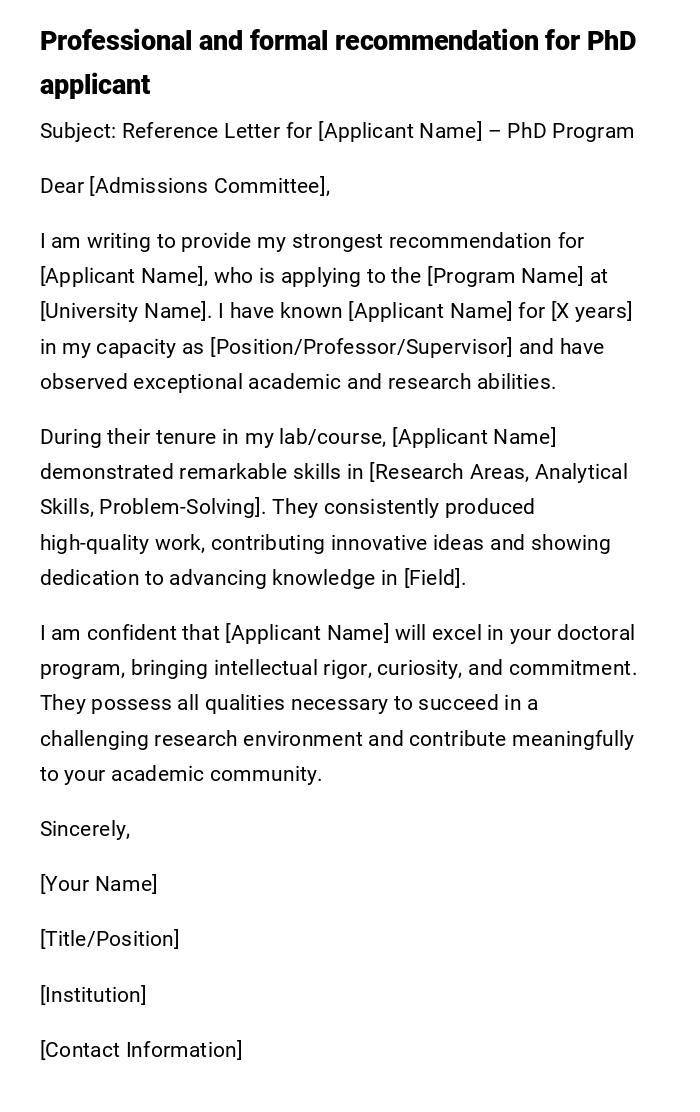
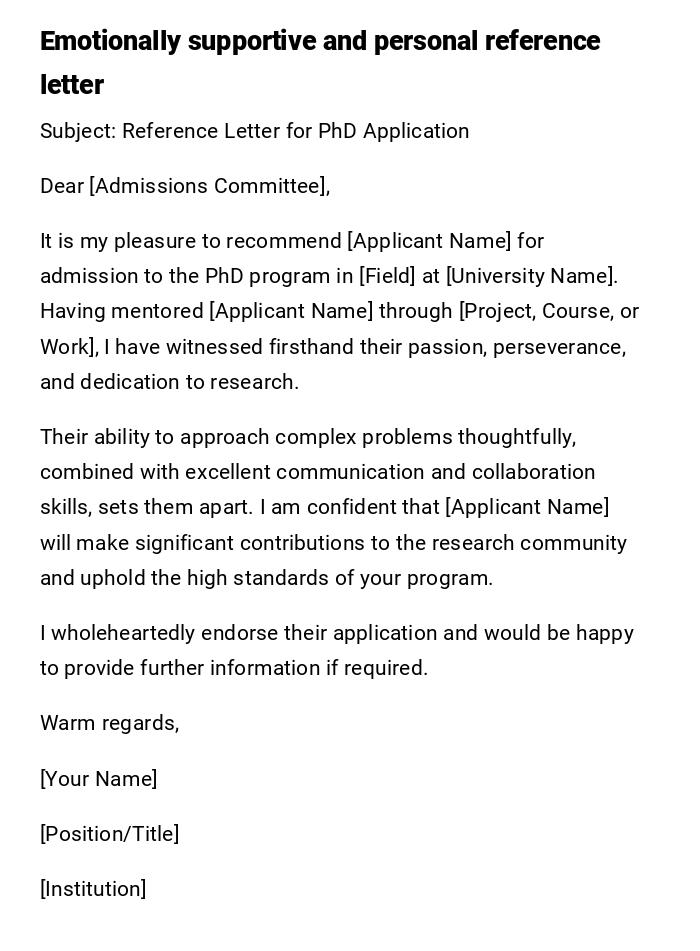
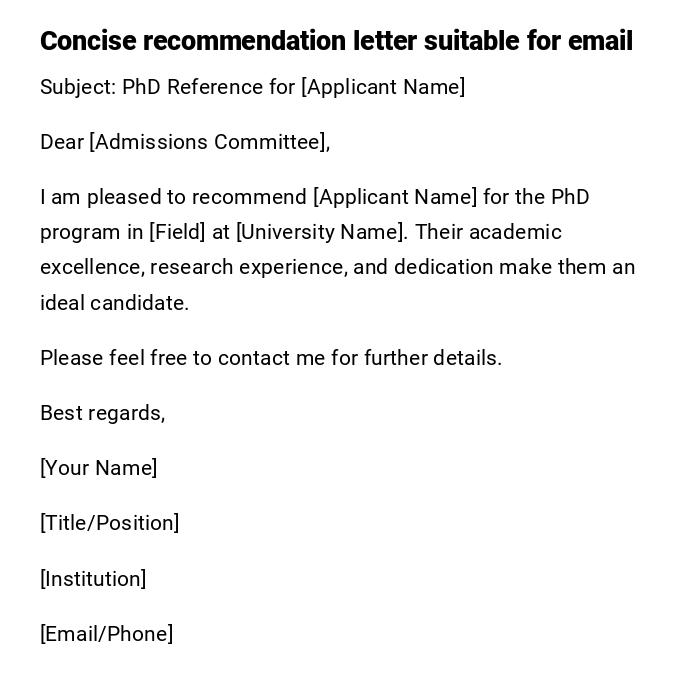
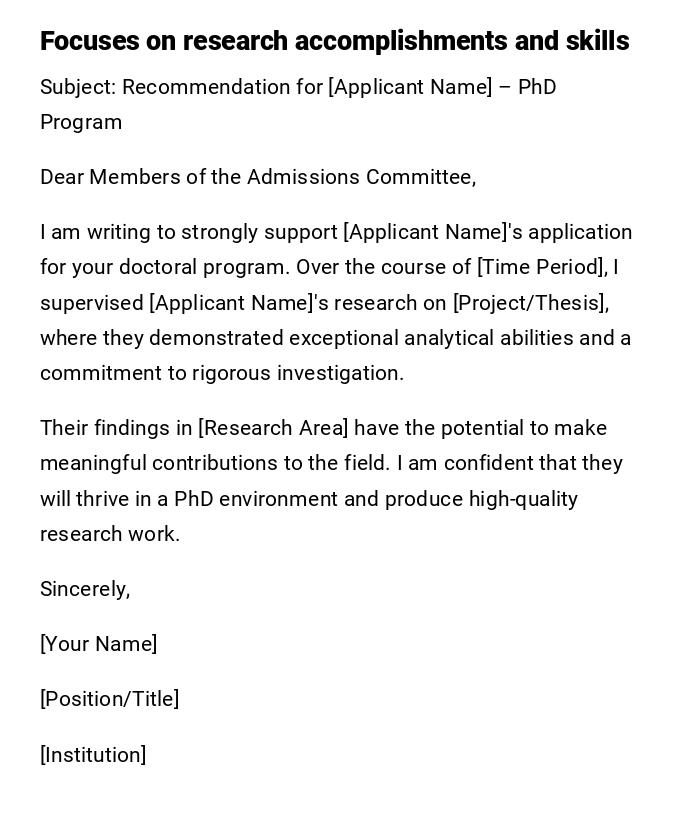
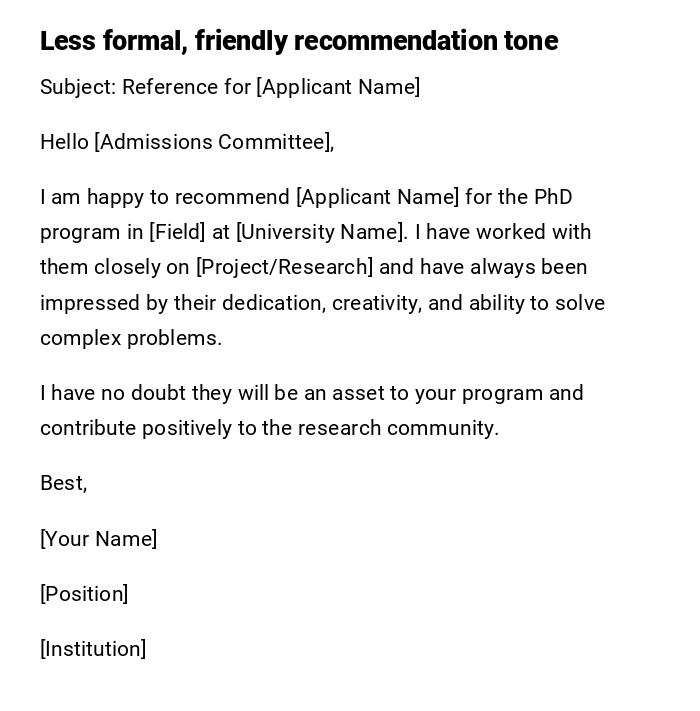

 Download Word Doc
Download Word Doc
 Download PDF
Download PDF